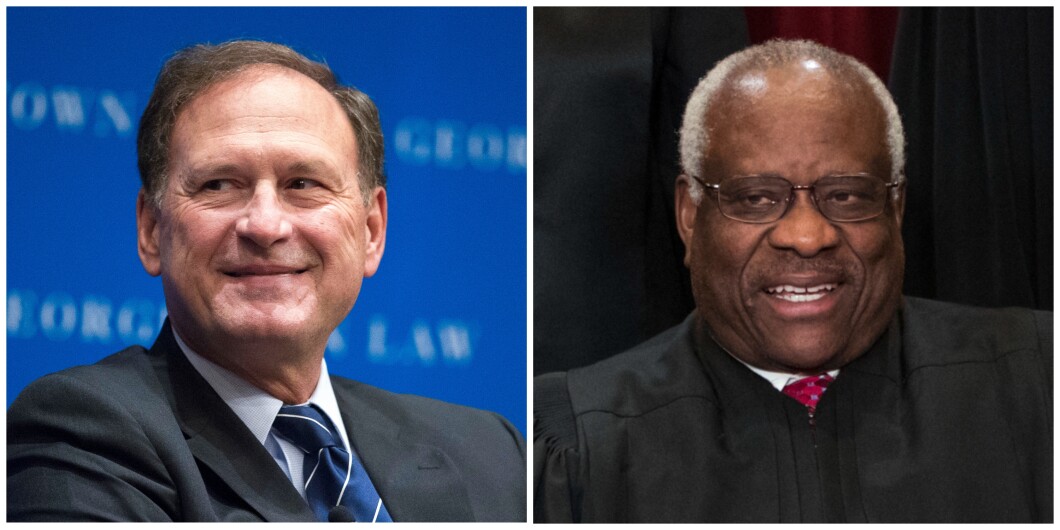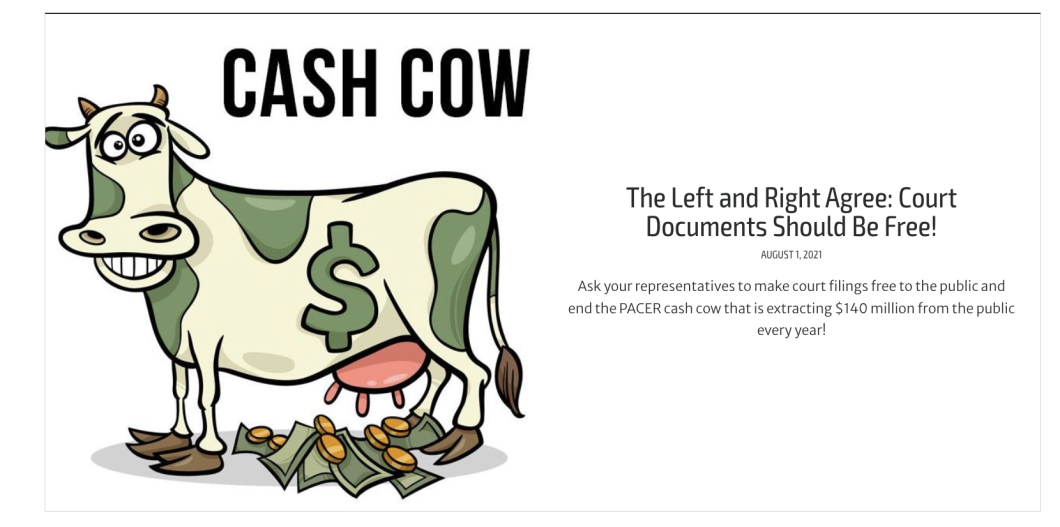
EXCLUSIVE — A Supreme Court advocacy group alleging ethics violations among justices including Clarence Thomas and Samuel Alito likely failed to disclose its own apparent lobbying in violation of federal law, according to experts.
Fix the Court, a charity that used to be a project of the New Venture Fund, an influential nonprofit group that the left-wing dark money behemoth and for-profit consultancy Arabella Advisors manages, is helping to lead a seemingly coordinated campaign demanding Supreme Court justices publicize more about their finances. Those mounting efforts haven’t stopped Fix the Court from not reporting activities on financial disclosures that could constitute grassroots lobbying, multiple tax lawyers told the Washington Examiner.
ALL IN THE FAMILY: DEMOCRAT MAXINE WATERS PAYS THOUSANDS MORE FROM CAMPAIGN TO DAUGHTER
That Fix the Court may have not disclosed lobbying could further undercut its position as a watchdog committed to “transparency.” In May, Fix the Court Executive Director Gabe Roth notably panicked after unwittingly leaking to the Washington Examiner his group’s donors, which included liberal entities such as the New Venture Fund, the William and Flora Hewlett Foundation, and the Rockefeller Brothers Fund. Senate Democrats last week advanced a bill supported by Roth called the Supreme Court Ethics, Recusal, and Transparency Act, which aims to mandate a code of conduct for justices.
Senate Republicans recently claimed Roth’s panicked donor leak response amounted to sheer hypocrisy, since Fix the Court is one of a handful of groups taking aim at justices not disclosing gifts and other financial matters, despite a lack of laws requiring doing so. The charity has, for instance, blasted Thomas for not reporting information about his relationship with Texas billionaire and real estate mogul Harlan Crow and also Alito after he wrote an op-ed in the Wall Street Journal defending not reporting a 2008 trip he took with hedge-fund billionaire Paul Singer.
The Washington Examiner found numerous examples on Fix the Court’s archived website from 2021 and 2022 in which the organization urged the public to demand lawmakers adopt certain measures. Experts in tax-exempt law say some of the calls could amount to grassroots lobbying, which “attempts to influence legislation by attempting to affect the opinion of the public with respect to the legislation and encouraging the audience to take action with respect to the legislation,” according to the IRS.
Charities like Fix the Court may lobby so long as it accounts for up to 20% of their annual expenditures, but they are required to make public their activities, according to the IRS. Fix the Court checked the box “no” on tax forms for 2021 and 2022 to the question of whether it lobbied, records show.
In October 2022, Fix the Court published a blog post on its website detailing bills in the 117th Congress that it supported. One such measure was the Judiciary Accountability Act, which would mandate certain workplace conduct policies for the court in connection to harassment and whistleblowers. Earlier that year, in January, Fix the Court instructed the public in a post titled, “The Judiciary Must Do More to Prevent Harassment in the Courthouse” to “Ask your senators and representatives to protect the employees of the Judiciary!”
Gary Lawkowski, an attorney for Dhillon Law Group specializing in nonprofit groups and campaign finance, said it’s odd Fix the Court claimed on disclosures that it didn’t lobby. “Several of their communications from 2021 and 2022 appear to be classic grassroots lobbying campaigns, proposing legislative solutions and urging the public to contact their legislators to adopt their preferred measures,” he told the Washington Examiner.
“The proximity of the favorable reference to the Judicial Accountability Act and the call to action makes this grassroots lobbying, the cost of which should have been reported on Form 990,” Alan Dye, a partner at Webster, Chamberlain, & Bean, said.
Fix the Court could open itself up to penalties from the IRS should the agency determine that it failed to report its apparent formal advocacy, according to experts. Charities that lobby too much may also risk losing tax-exempt status, the IRS says on its website.

Fix the Court has also made other calls to action that tax lawyers say appear to constitute grassroots lobbying. It’s housed a “Cash Cow” blog post on its website titled “The Left and Right Agree: Court Documents Should Be Free,” with the description, “Ask your representatives to make court filings free to the public and end the PACER cash cow that is extracting $140 million from the public every year!” according to archived records.
The organization also touted its endorsement in 2022 of the Open Courts Act, a measure that would make PACER, the online federal court documents service, complimentary.
Fix the Court in 2022 endorsed the Cameras in the Courtroom Act, which would allow recording devices in the Supreme Court, according to its website. The charity has separately charged in a blog post dubbed, “Help Us End the Broadcast Media Ban at the Supreme Court,” that the public should, “Make a difference by asking your representatives to support bipartisan ideas that will open up the Supreme Court to live audio,” archived records show.
“They appear to be engaging in grassroots lobbying,” said Paul Kamenar, counsel to the National Legal and Policy Center, which is considering filing another IRS complaint against Fix the Court. The conservative watchdog alleged in a June IRS complaint that Fix the Court should be investigated for seemingly overpaying Roth.
Patrick Sternal, a lawyer who worked at the IRS between 2012 and 2020, including as an adviser in its chief counsel office for exempt organizations, agreed with Kamenar that Fix the Court appears to have lobbied and should have reported it.

The comments from the lawyers come as the group continues to be cited by Democratic lawmakers and media outlets as one of the primary entities calling for increased disclosure requirements for the judiciary. Sen. Sheldon Whitehouse (D-RI), who introduced the recent ethics bill that advanced, has included references to Fix the Court in press releases and letters at least seven times from 2022 to 2023.
Meanwhile, many links on Fix the Court’s website for blog posts do not work properly, as of this writing, the Washington Examiner found. Posts on its “action center” page redirect to an error message hosted by NGP VAN, a software and web hosting service provider for the Democratic Party, including campaigns in 2020 for now-President Joe Biden and Hillary Clinton’s 2016 presidential campaign, campaign finance disclosures show.
CLICK HERE TO READ MORE FROM THE WASHINGTON EXAMINER
“Fix the Court is a cheap, partisan operation,” said Scott Walter, president of Capital Research Center, a conservative investigative think tank. “Roth’s fellow Democratic partisans should stop citing this group as a legitimate source on ethics.”
Fix the Court did not reply to multiple requests for comment.






